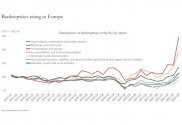You are using an out of date browser. It may not display this or other websites correctly.
You should upgrade or use an alternative browser.
You should upgrade or use an alternative browser.
European Economics Thread
- Thread starter PiSigma
- Start date
Europe Loses Another Smelter as Energy Crisis Leaves Deep Scars
March 9, 2023... Another European aluminum smelter is closing, in a fresh sign of the damage wrought by an energy crisis that’s hammered the region’s industrial economy and crimped supplies of critical raw materials.
While power prices have retreated sharply from last year’s peaks, Speira Gmbh will shut its Rheinwork plant in Germany this year due to challenges in the energy market, the company said Thursday. That follows a 50% cut in aluminum production announced in September as soaring power and gas prices plunged Europe’s energy-intensive metals industry into an existential crisis.
Some smelters have been ramping back up in recent weeks, but the Speira shutdown is the latest sign of the obstacles politicians face as they seek to prevent a further wave of deindustrialization. They are also looking to shore up local supplies of critical industrial raw materials as global supply chains become more fragile.
...
Speira will now focus solely on recycling and processing aluminum into value-added products, it said. While the decision to close the smelter will affect about 300 employees, the company will deliver all contracted sales to its customers, replacing the curtailed production with external metal supplies.
For EU, at the current rate of business destruction it won’t be long before businesses are closing at a faster rate than they are opening. :
 The country that witnessed the in bankruptcies last year was Spain. Other EU countries that have seen a notable increase in bankruptcies in 2022 include Austria (57%), France (51%), Belgium (42%), the Netherlands (18%) and Finland (8.5%).
The country that witnessed the in bankruptcies last year was Spain. Other EU countries that have seen a notable increase in bankruptcies in 2022 include Austria (57%), France (51%), Belgium (42%), the Netherlands (18%) and Finland (8.5%).
As Euractiv in January, insolvencies in France and across Europe have hurt small businesses, particularly one-person outfits, the most. “When SMEs fall, it is the whole local economic network that is impacted,” Thierry Millon, who directed the study, told EURACTIV France. “They can no longer pay their suppliers, and the job loss is much greater across the value chain,” he said.
 The country that witnessed the in bankruptcies last year was Spain. Other EU countries that have seen a notable increase in bankruptcies in 2022 include Austria (57%), France (51%), Belgium (42%), the Netherlands (18%) and Finland (8.5%).
The country that witnessed the in bankruptcies last year was Spain. Other EU countries that have seen a notable increase in bankruptcies in 2022 include Austria (57%), France (51%), Belgium (42%), the Netherlands (18%) and Finland (8.5%).As Euractiv in January, insolvencies in France and across Europe have hurt small businesses, particularly one-person outfits, the most. “When SMEs fall, it is the whole local economic network that is impacted,” Thierry Millon, who directed the study, told EURACTIV France. “They can no longer pay their suppliers, and the job loss is much greater across the value chain,” he said.
Rotting gardenFor EU, at the current rate of business destruction it won’t be long before businesses are closing at a faster rate than they are opening. :
View attachment 109121The country that witnessed the in bankruptcies last year was Spain. Other EU countries that have seen a notable increase in bankruptcies in 2022 include Austria (57%), France (51%), Belgium (42%), the Netherlands (18%) and Finland (8.5%).
As Euractiv in January, insolvencies in France and across Europe have hurt small businesses, particularly one-person outfits, the most. “When SMEs fall, it is the whole local economic network that is impacted,” Thierry Millon, who directed the study, told EURACTIV France. “They can no longer pay their suppliers, and the job loss is much greater across the value chain,” he said.
Rotting garden
Nah. More like Garden Burger. Insipid taste wise but will fill you up if you are sufficiently hungry.
Things are moving really fast this past week. CS went through multiple ups and downs, but everything feels like 2008. I'm not 100% that CS will be taken over by UBS. Things could unravel depending on other major banks and such.
Although the first bank failures were in America, Europe will be the hardest hit here. Suisse banks suffer the most from sanctioning Russian accounts. Major Chinese & possibly other Asian accounts have taken their money out of Swiss banks
We will see what happens here, but 2010 to 2014 was rough in Europe. It would be hard to not see re-run of that episode here.
interesting to read back on my own post of getting spooked back 5 months ago. Turned out SNB did step in and save them initially, but that only gave them a temporary reprieve. SVB basically triggered the current flight of bank runs.The biggest story this next week might be Credit Suisse. They are one of the 2 largest Swiss banks along with UBS. There are persistent rumors everywhere this week that CS is in trouble. It has now picked up to the point where everyone is talking about an imminent CS demise. We got a bears/lehman moment on hand right now.
I don't say this lightly. Back in 2008, I was just in finance industry not even 2 years. The US financial world was collapsing around me. Bears and Lehman fell in what appeared to be a couple of weeks. 2 of the big 4 investment banks going under. Morgan Stanley was under pressure next. Speculation was that they were very close to ceasing operation and the fed really stepped in at the last moment to save Morgan Stanley. At the time, I was told that if MS went under, Goldman was next to fall. People not around the financial industry often don't realize how fragile the entire system is.
So, we are at another of those moment now. While people on this forum are focusing on inflation and de-industrialization, the most immediate problem facing the EU is financial sector. We are at a point where CS is talking to major investor right now to prevent a bank run. Just recently, CS had announced they were leaving the US market and laying off a whole bunch of people. The rapidly rising interest rates is something the banks aren't handling very well.
It's possible that CS will go under next week. It's unclear to me if swiss central bank stepping you can save them. Even if CS doesn't fall in the next month, there are several obvious suspects afterward. Deutsche bank is apparently having real issues too. Given the recent pension fund run that we saw in UK, Barclays and RBS are obvious weak points. If memory serves me correctly, after the first bank falls, we get into a market panic that lasts probably 3 months or longer of people speculating which banks is next.
Keep in mind that most banks are heavily leveraged. They lend out a lot of money. They can have a liquidity crisis the moment that investors and businesses decide to pull their money at the same time. That's how bank runs work. You can be profitable last year and have a bank run this year. Once the banks don't have enough cash liquidity on hand, they won't be able to operate. With the volatility we are seeing, there will be huge swings in the market causing higher margin requirements, which will further exacerbate the cash situation.
We are at the point where Western banks can't handle 5% interest rate, so we are stuck with persistent inflation or banking failure.
Strip the riches from their riches and there's plenty money for anyone. Especially for the elder people. Show some respect bastards

